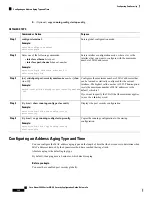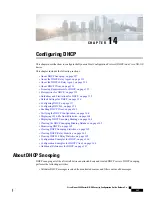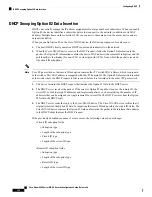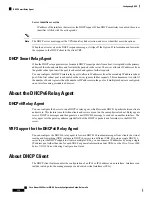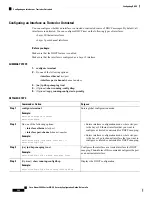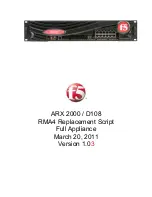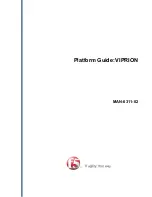
Server identifier override
IP address of the interface that receives the DHCP request. When DHCP smart relay is enabled, the server
identifier is filled with the active giaddr.
The DHCP server must support the VPN identifier, link selection, and server identifier override options.
Note
When the device receives the DHCP response message, it strips off the Option 82 information and forwards
the response to the DHCP client in the client VRF.
DHCP Smart Relay Agent
When the DHCP relay agent receives broadcast DHCP request packets from a host, it sets giaddr to the primary
address of the inbound interface and forwards the packets to the server. The server allocates IP addresses from
the giaddr subnet pool until the pool is exhausted and ignores further requests.
You can configure the DHCP smart relay agent to allocate IP addresses from the secondary IP address subnet
pool if the first subnet pool is exhausted or the server ignores further requests. This enhancement is useful if
the number of hosts is greater than the number of IP addresses in the pool or if multiple subnets are configured
on an interface using secondary addresses.
About the DHCPv6 Relay Agent
DHCPv6 Relay Agent
You can configure the device to run a DHCPv6 relay agent, which forwards DHCPv6 packets between clients
and servers. This feature is useful when clients and servers are not on the same physical subnet. Relay agents
receive DHCPv6 messages and then generate a new DHCPv6 message to send out on another interface. The
relay agent sets the gateway address (giaddr field of the DHCPv6 packet) and forwards it to the DHCPv6
server.
VRF Support for the DHCPv6 Relay Agent
You can configure the DHCPv6 relay agent to forward DHCPv6 broadcast messages from clients in a virtual
routing and forwarding (VRF) instance to DHCPv6 servers in a different VRF. By using a single DHCPv6
server to provide DHCP support to clients in multiple VRFs, you can conserve IP addresses by using a single
IP address pool rather than one for each VRF. For general information about VRFs, see the
Cisco Nexus 9000
Series NX-OS Unicast Routing Configuration Guide
.
About DHCP Client
The DHCP client feature enables the configuration of an IPv4 or IPv6 address on an interface. Interfaces can
include routed ports, the management port, and switch virtual interfaces (SVIs).
Cisco Nexus 9000 Series NX-OS Security Configuration Guide, Release 9.x
334
Configuring DHCP
DHCP Smart Relay Agent

